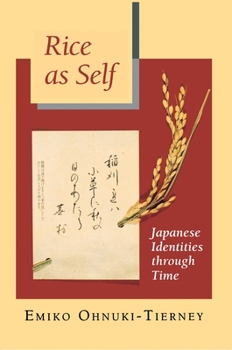Rice as Self: Japanese Identities Through Time
Select Format
Select Condition 
Book Overview
Are we what we eat? What does food reveal about how we live and how we think of ourselves in relation to others? Why do people have a strong attachment to their own cuisine and an aversion to the... This description may be from another edition of this product.
Format:Paperback
Language:English
ISBN:0691021104
ISBN13:9780691021102
Release Date:November 1994
Publisher:Princeton University Press
Length:200 Pages
Weight:0.70 lbs.
Dimensions:0.5" x 6.1" x 9.4"
Customer Reviews
1 rating
Grains of truth, some of it unpalatable
Published by Thriftbooks.com User , 17 years ago
Not one American in 10,000 has any connection with growing or selling rice, so the pressure of the American government to open up Japan to our rice stands as the most bizarre of all the weird legacies of Reaganomics. Emiko Ohnuki-Tierney, professor of anthropology at the University of Wisconsin, believes the rice trade had assumed (at the time this book was published, in 1993) a symbolic importance to American policymakers. Perhaps so, although they speak as if the question is substantial. However, 'Rice as Self' is not about America's dangerous delusions about rice. It is about Japanese attitudes toward the grain, and it turns out they are in some ways deluded as well, though harmlessly so. 'A people's cuisine, or a particular food, often marks the boundary between the collective self and the other, for example, as a basis of discrimination against other people,' writes Ohnuki-Tierney, who was born in Japan and has investigated 'others' there, such as the Ainu. In America, we are often told that rice is so basic to Japanese ways that the words for breakfast and dinner translate literally as 'morning rice' and 'evening rice.' But Ohnuki-Tierney says this centrality is more psychic than physical. There is an intellectual dispute in Japan about whether rice was ever the staple food there. The common people may have been more dependent on millet or, later, sweet potatoes. But there is no denying the importance of rice to Japanese ways of thinking. Rice is not 'self' the way Hawaiians regard themselves as interchangable with kalo (taro, the elder brother of the first Hawaiian), but it was a gift from the gods. It has a soul, is the 'purest' form of payment and may also be equivalent to semen. Even if you are what you eat, this is a heavy load of symbolism for a food to carry. And it retains its symbolic force, says Ohnuki-Tierney, though 'scarcely any contemporary Japanese would hold . . . that rice has a soul or that rice is a deity.' Paradoxically, 'the symbolism of rice has remained more important for the Japanese people than rice agriculture itself.' As affluence has increased, the Japanese have eaten less and less rice, preferring to fill up on what used to be side dishes of vegetables, fish and flesh. (In Hawaii, the 'two-scoop rice' of the old-time okazu-ya [cafeteria] lunch has in recent years been reduced, usually, to just one scoop.) At the same time, they have become even fussier about their rice, specializing in the grain grown in the northeastern prefectures. Production, however, is very low. Ohnuki-Tierney says 10 million kilos a year, a misprint for 10 million tons. Still, that is only half a pound a day per person, not an enormous amount. (In another place, she gives consumption as 72 kilograms per person per year, which matches the correct production figure.) The paradoxes keep piling up. Though Japan fiercely protects its rice agriculture, it produces less of its food than any other nation -- 49 percernt in 1988. The United States





